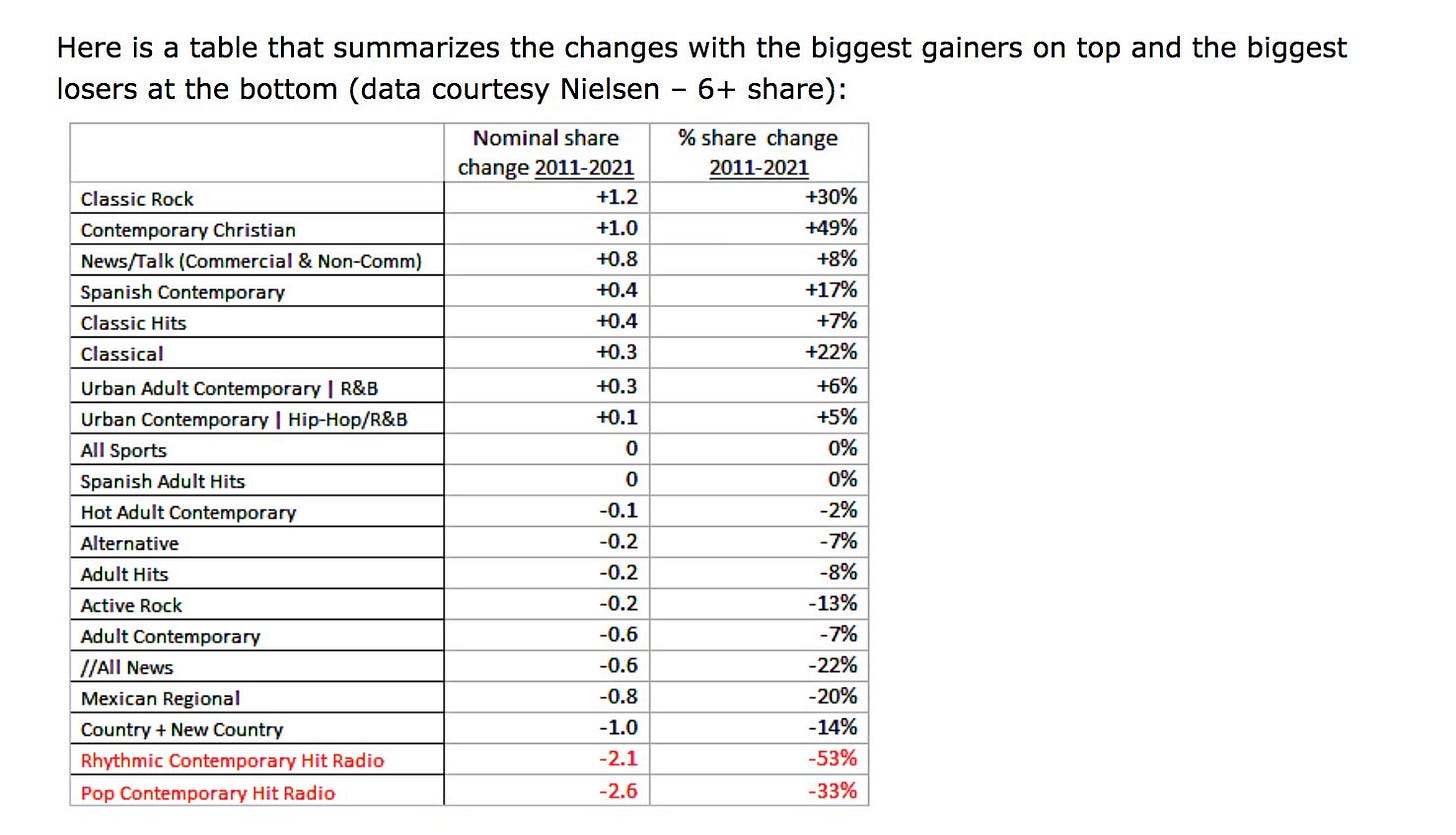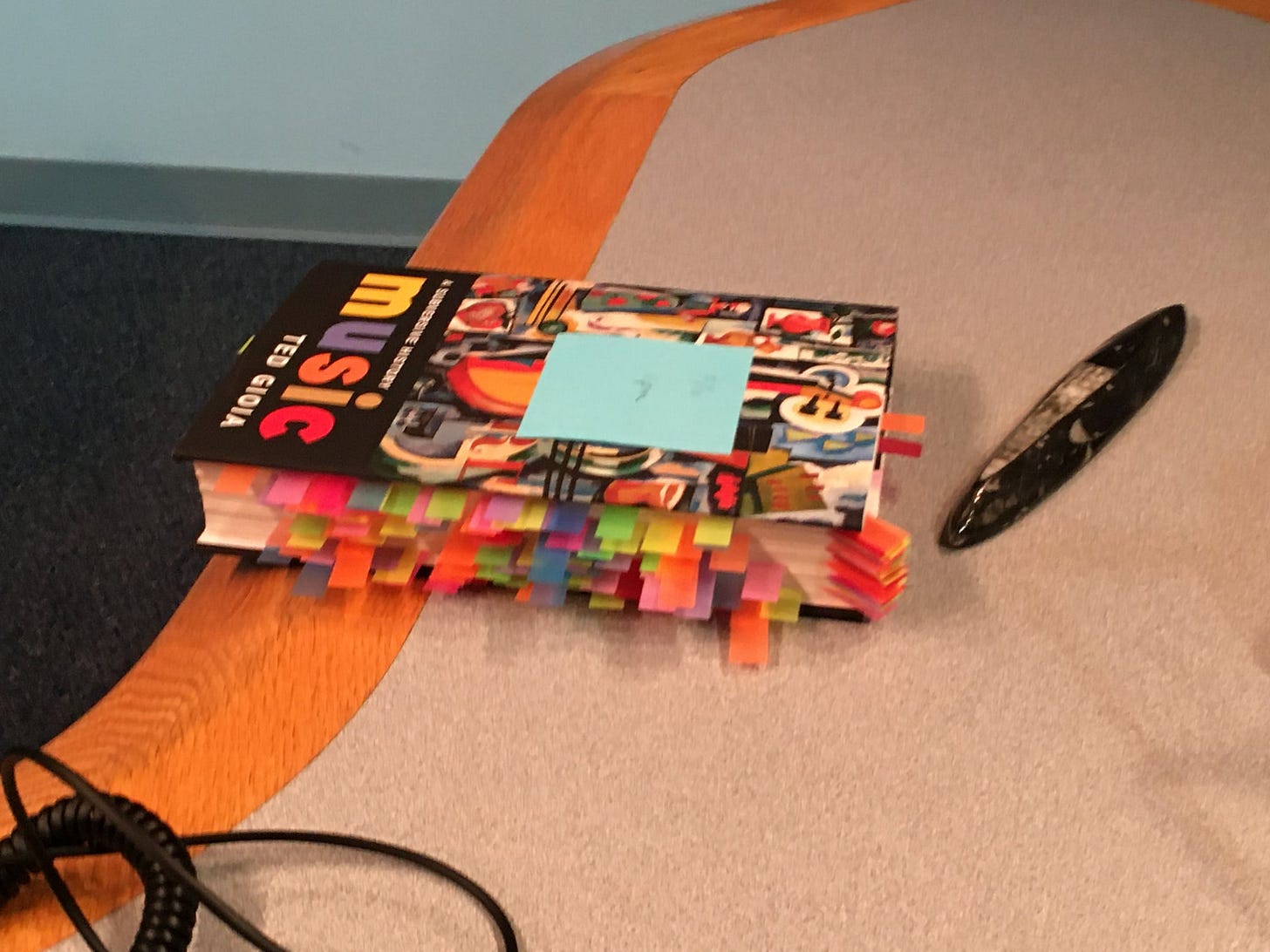My Appearance on CNBC—and Other Responses to the 'Old Music Killing New Music' Article
I must have struck a raw nerve. . .
My article on old music killing new music must have hit a raw nerve. It generated quite a response—with many offering their own perspectives on the matter. Within a few hours it set a record for clicks, links, retweets, and comments on The Honest Broker.
The Honest Broker is a reader-supported guide to music, books, and culture. Both free and paid subscriptions are available. If you want to support my work, the best way is by taking out a paid subscription.
Larry Rosin sent me some information on radio station formats that showed how dramatically the marketplace has abandoned new songs over the last decade. Even I was surprised by the numbers. Check out this table, which makes painfully clear the retreat from current hits. Radio is tilted to commuters in cars, so it doesn't measure the whole audience, but still...
Another reader made an amusing connection to Christmas songs (which I shared in my interviews yesterday). We have grown used to hearing the same songs in December, and don’t even expect to discover new ones. The tracks hardly change from year to year. The only new development is that the same thing is now happening every other month, with a body of canonical popular tunes dominating the public soundscapes. And that mix of familiar songs changes—if at all—at the slowest possible pace.
Hey, it’s like Christmas every day of the year!
Here are a few additional reactions:
Or:
I heard similar comments from other readers:
And then there was this:
I was especially surprised by how many people outside the music world had strong reactions. Yesterday, I did a round of interviews, and none of them were on music or entertainment media outlets—including this appearance on CNBC last night.
I will be talking about this subject again in other settings during the coming days. Next week, I’m doing an interview on KCRW, the NPR affiliate in Santa Monica—one of my favorite radio stations on the West Coast. On Monday, I will spend an hour with their music and culture host Madeleine Brand—however, I don’t know yet whether this will be live on the air or prerecorded for later in the week.
And on February 1, I’ll spend an hour with host Krys Boyd on her fine NPR interview show Think. Her daily broadcast, on NPR affiliate KERA, is syndicated on about a hundred stations, so I might be on the air in your neighborhood.
I’ve had a few previous encounters with Krys on the air, all of them quite memorable. She is one of the best prepared interviewers on the scene today. The last time I visited her in the studio, she had a copy of my book on her desk. This is what it looked like
That’s the kind of behind-the-scenes preparation she brings to her craft. So I’m looking forward to talking with her about the new music/old music controversy.
I may need to write about this subject again. In particular, I want to address the single most prevalent opinion I heard in response to my article—namely that the older songs are simply better than the new ones. Could it really be that simple? That’s a big issue, with all sorts of ramifications. Too big for me to address in passing here, but I hope to tackle it soon.
Update: The Atlantic has now reprinted my new music/old music article. And Rick Beato has released a smart YouTube video commentary on it.









My husband and I have co-hosted The Basement Tapes with Nick and Bootsy for 12 years. We started on local FM (Rolla, MO) and played original music by local artists. Several years ago, we started streaming online from home. Over time, we realized that EVERYBODY is local to somewhere and as a result, we expanded our range to local music Earth and have played music from across the globe. There is some AWESOME new music out there in a variety of genres. On our show, it’s been increasingly hard to share songs online without getting hit with copyright strikes even when we’re playing songs that we got directly from the artist, their management/promotion team or independent label. We’re very small players in a very big game, one that’s getting harder and harder to play.
As a recovering Wall Street technology stock analyst, I was struck when reading 'Music: A Subversive History' of the parallels I had encountered years ago reading Clayton Christensen's 'The Innovator's Dilemma; When New Technologies Cause Great Firms to Fail.' The big difference, though, was the element of time - in the world of hardware, there is an element of physics at play (things need to be developed, produced, distributed, sold and deployed, so just as nine women can't produce a newborn in one month, there's a built-in governor on the speed of displacement). But in the creative/intellectual realm, the physical limitations are secondary to cultural limitations. As a result, it gets back to the fundamental tug-of-war between greed and fear .
Be that as it may, the similarity between the two books is the focus on the significance of the disrespect shown to the upstart. In 'Dilemma' the point is stressed that the benefits of change work to favor the smaller and faster-growing elements, while the older, more-entrenched competitors are slower (and often dumber due to their vested interests). This is akin to the work of the late, great Air Force Col. John Boyd, who stressed his OODA loop - observation, orientation, decision, action; pilots who had tighter OODA loops would invariably triumph over their slower competitors - as well as his Energy/Maneuverability Theory. I believe that the problems you've identified in music are different only because the innovators can be temporarily trampled by the status quo - right up to the point when they rise up in volcanic fashion to totally disrupt the landscape.
Because entertainment (in general) and music (specifically) are gaseous in nature (they rapidly expand to fill available volume, but compress quite easily), they tend to grow very fast. While beneficial, that rapid growth also means that they encounter the problems of maturity and the effects of technological change are revealed that much faster. These industries are to business what fruit flies are to geneticists - they tend to demonstrate what happens to everything else, just on a much-shortened time scale.
If there's anything that music shares with a host of other elements of the business world right now, it is the detrimental effects of excessive capital -the entrenched are more so, and the availability of so much money means that a lot of really crappy ideas are getting funded along with the usual amount of good ones. The result is that the next wave of greatness is confronted by a two-fold problem (irritatingly poor competition and frustratingly stupid vested interests. But not to fear - this situation will correct. The longer it takes to occur, the more dramatic the correction/inflection point is likely to be. And it's likely to be obvious only with benefit of hindsight.
Sorry for the length of this comment - as usual, you provoke a bunch of thinking. Thanks for that. And I started reading John Mauceri's 'For the Love of Music: A Conductor's Guide to the Art of Listening' yesterday, so the pump was primed!